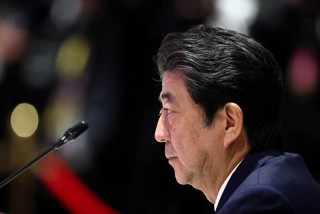Loading
Search
▼ Japan Unveils $120 Billion Fiscal Boost To Fight External Risks, Post-Olympics Slump
- Category:Event
TOKYO (Reuters) - Japan unveiled a $120 billion fiscal package on Thursday to support stalling growth in the world's third-largest economy amid offshore risks and as policymakers look to sustain activity beyond the 2020 Tokyo Olympics.
Prime Minister Shinzo Abe announced the 13 trillion yen ($119.7 billion) package on Thursday, the size of which had been reported previously. The government is expected to announce further details of the package later in the day after the cabinet has approved it.
"We managed to compile a strong policy package," Abe told a gathering of ruling party lawmakers and government officials on Thursday.
"It's based on three pillars of ensuring disaster rebuilding and safety, providing intensive support to overcome downside economic risks and sustaining economic vitality after the Tokyo Olympics," he added.
The economic package amounts to 25 trillion yen ($230 billion) when government loans, credit guarantees and private-sector spending are included, sources have told Reuters this week.
Japan's economy ground to a near halt in July-September as the global slowdown knocked exports. Retail sales also tumbled at their fastest pace in more than 4-1/2 years in October as a sales tax hike prompted shoppers to tighten their purse strings.
"Fiscal policy is a smart thing to do right now particularly because there really isn't much opportunity for any monetary policy movement given that there just isn't any space on the monetary policy side," said Moody's Analytics economist Steve Cochrane before Abe's announcement.
"If it's infrastructure spending or spending on education and training for either young people or retraining the older generation that is staying in the labour force longer – these are activities that would provide near-term juice for the economy but maybe have long-term impact as well," Cochrane added.
In compiling the package, Japan's heavily indebted government will tap stretched fiscal space to combat overseas risks and the impact of a sales tax hike.
The 13 trillion yen includes more than 3 trillion yen from fiscal investment and loan programmes, as the heavily indebted government seeks to take advantage of low borrowing costs under the central bank's negative interest rate policy.
The spending will spread over a supplementary budget for this fiscal year to March and an annual budget for the coming fiscal year from April, both to be compiled later this month.
"Rather than pushing up the economy, we see it as easing negative factors," said Takumi Tsunoda, senior economist at Shinkin Central Bank Research Institute.
The stimulus package is smaller than the last major package compiled in 2016, worth 28 trillion yen, when the Brexit vote darkened the Japan's export outlook.
To strike the balance between spurring growth and maintaining fiscal discipline, Tokyo will steer clear of fresh deficit-covering bond issuance, the Nikkei business daily reported this week.
Prime Minister Shinzo Abe announced the 13 trillion yen ($119.7 billion) package on Thursday, the size of which had been reported previously. The government is expected to announce further details of the package later in the day after the cabinet has approved it.
"We managed to compile a strong policy package," Abe told a gathering of ruling party lawmakers and government officials on Thursday.
"It's based on three pillars of ensuring disaster rebuilding and safety, providing intensive support to overcome downside economic risks and sustaining economic vitality after the Tokyo Olympics," he added.
The economic package amounts to 25 trillion yen ($230 billion) when government loans, credit guarantees and private-sector spending are included, sources have told Reuters this week.
Japan's economy ground to a near halt in July-September as the global slowdown knocked exports. Retail sales also tumbled at their fastest pace in more than 4-1/2 years in October as a sales tax hike prompted shoppers to tighten their purse strings.
"Fiscal policy is a smart thing to do right now particularly because there really isn't much opportunity for any monetary policy movement given that there just isn't any space on the monetary policy side," said Moody's Analytics economist Steve Cochrane before Abe's announcement.
"If it's infrastructure spending or spending on education and training for either young people or retraining the older generation that is staying in the labour force longer – these are activities that would provide near-term juice for the economy but maybe have long-term impact as well," Cochrane added.
In compiling the package, Japan's heavily indebted government will tap stretched fiscal space to combat overseas risks and the impact of a sales tax hike.
The 13 trillion yen includes more than 3 trillion yen from fiscal investment and loan programmes, as the heavily indebted government seeks to take advantage of low borrowing costs under the central bank's negative interest rate policy.
The spending will spread over a supplementary budget for this fiscal year to March and an annual budget for the coming fiscal year from April, both to be compiled later this month.
"Rather than pushing up the economy, we see it as easing negative factors," said Takumi Tsunoda, senior economist at Shinkin Central Bank Research Institute.
The stimulus package is smaller than the last major package compiled in 2016, worth 28 trillion yen, when the Brexit vote darkened the Japan's export outlook.
To strike the balance between spurring growth and maintaining fiscal discipline, Tokyo will steer clear of fresh deficit-covering bond issuance, the Nikkei business daily reported this week.
- December 5, 2019
- Comment (0)
- Trackback(0)


